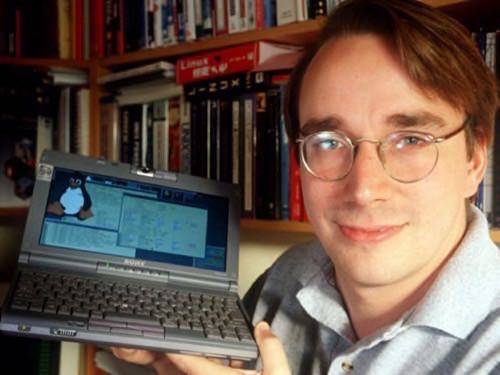
Twenty-two years ago Linux was born as a “(free) operating system” that founder Linus Torvalds was quick to downplay as “just a hobby” that wouldn’t “be big and professional.” My, but how times have changed. So much so that Linux now dominates mobile (Android), servers and cloud. No wonder that Microsoft CEO Steve Ballmer derided Linux in 2001 as a “cancer” that “attaches itself… to everything it touches.”
He was right. At least, as it relates to Linux’s effect on Microsoft.
Earlier this week Torvalds celebrated the 22nd birthday of Linux by cheekily calling Linux “just a hobby, even if it’s big and professional” now in a way he never envisaged back in 1991. To help gauge just how far we’ve come since then, I asked Eucalyptus CEO (and fellow Finn) Marten Mickos and Cloudera Chief Strategy Officer Mike Olson to help put open source in perspective. Both men have had an outsized impact on open source, particularly the business of open source, and neither were shy about estimating open source’s impact.
On The Maturing Power Of Open Source
One of the amazing things to have watched over the years is the market’s growing acceptance of this oddball movement, as Mickos highlights:
People didn’t know what it was, how it worked, why people did it, how it could produce great software, etc. That’s why the LAMP stack made it onto the front page of Fortune Magazine—it was so new and intriguing. Incumbents fought it. Now they embrace it (or at least pretend to).
Those who did open source just did it. Back then it was relatively few projects with relatively few people in them. Today there are probably 100-1000X the number of projects.
And while open source was born as an alternative way to develop and distribute software, it has become something more, as Olson intimates:
I’ve been pleased to see the ideas behind open source migrate to other important domains, and for APIs to become a kind of currency in the way that source code used to be. I think that open source was really a way to adopt the principles of scientific collaboration—i.e., publish your results, let your peers review and refine your work—to a field that badly needed it. I hope—I believe!—we are doing the same thing now with data and, to some extent, to services via cloud APIs.
On Torvalds’ Other Big Innovation… And Getting Along
Arguably one of the biggest things to happen to software development in a long, long time is GitHub, the wildly popular code repository. While Torvalds didn’t start GitHub, he did create git, the actual distributed version control system software itself. The creation of git is something that Olson credits with a very significant side effect:
It’s been really interesting to watch git emerge. I think of myself as pretty deep in software, but I really wasn’t paying it any attention five years ago. Remember when “fork” was an insult? Git encourages forking. It’s changed the way that open source projects work by fomenting more diversity.
While not referencing git, Mickos describes a similar benefit of open source’s peculiar licensing:
The purpose of the free and open source license and the governance model is not really to enable like-minded people to collaborate, although that’s a benefit too. It’s about enabling unlike-minded people to collaborate. The beauty of open source is that people who dislike each other can produce code for the same product.
In fact, while a genial person, Torvalds exemplifies one of the other characteristics of open source: a penchant for blunt, sometimes harsh, criticism. But this, insists Mickos, is one of the hallmarks of how open source succeeds:
When people complain about your open source project, you need to hear them as saying “I would love to love you, but right now I cannot.” If nobody is opposed to your open source product/project, you are not really being popular… If you on a sustaining basis can truly love harsh feedback and if you can truly show enthusiasm and appreciation for contributions of whatever magnitude and type, you can be wonderfully successful in open source.
Where Do We Go From Here?
For Olson, sitting as he does at the heart of the Big Data movement, open source’s future is wide open:
Open source has gone from a weird thing off on the fringes of hackerdom, through “cancer” and “communism,” to absolute mainstream. People now think intelligently about its different attributes—a collaborative development model, a frictionless distribution model, and a powerful way to win platform dominance.
Mickos, a key player in the growing cloud market, suggests that while open source developers may have lost a bit of their bite, their impact remains unbounded, if more circumspect:
In the early days of open source it seemed that open source developers were true cowboys—out on their own, following their own individual paths, valuing their nearly unlimited freedom. Today many open source developers are happy to be salaried employees of companies that don’t really stand for open source on a corporate level (Google, HP, IBM, Oracle, etc.). There is a voluntary submissiveness today that wasn’t as common before.
There is still a lot of unbridled enthusiasm, often bordering on naiveté—with all the amazing upsides and inevitable downsides that this will bring.
Mickos goes on to conclude that “Some people will spend any amount of time to save money. Some will spend money to save time. Without money, open source will die.” There’s a whole lot of money in open source these days. Just counting recent venture capital raised by the cloud and data companies amounts to hundreds of millions of dollars.
But the soul of open source has not been corrupted. Thanks, in no small degree, to Linus Torvalds and his Quixotic endeavor to change the world with something small that turned into something huge.

















